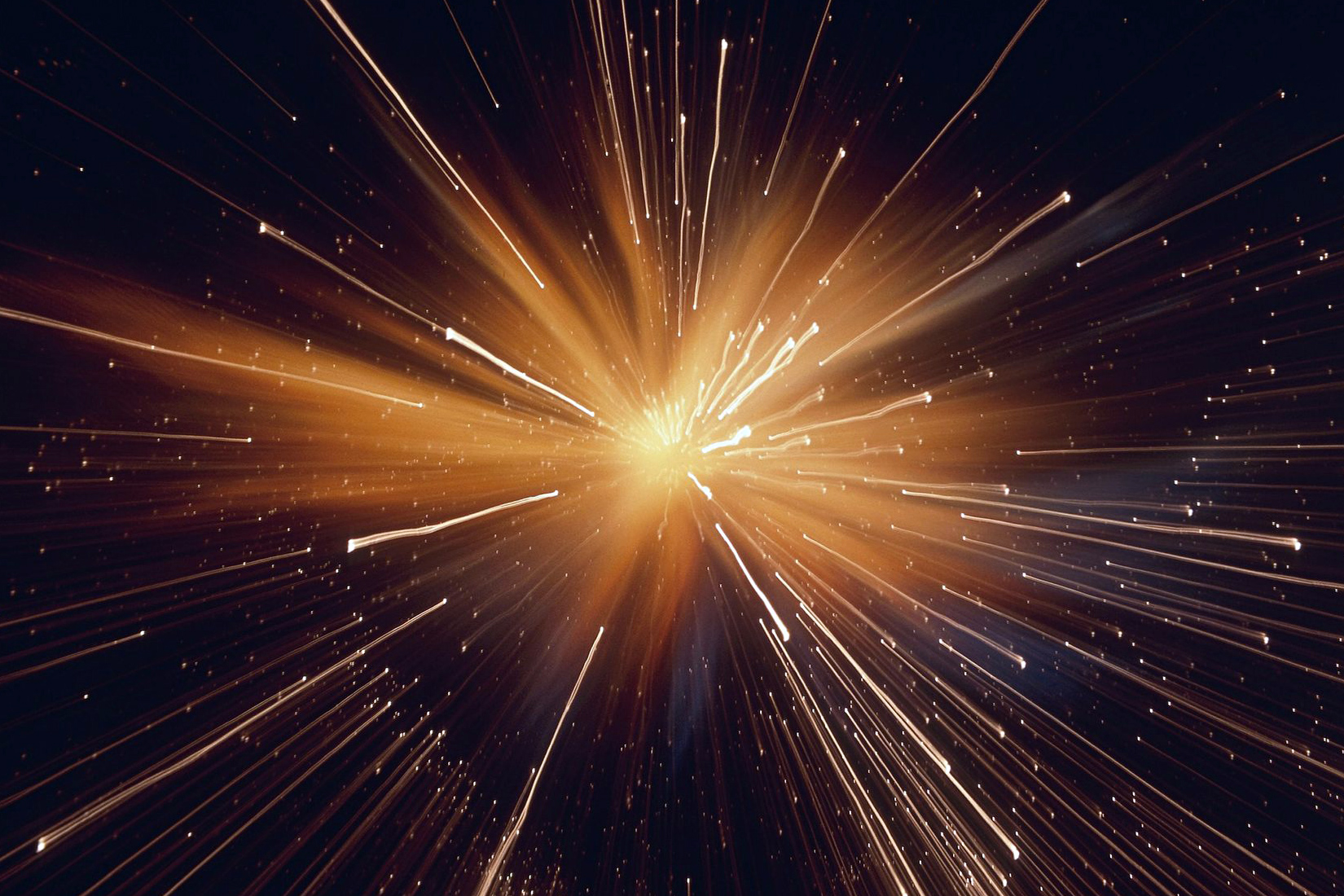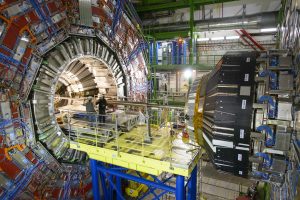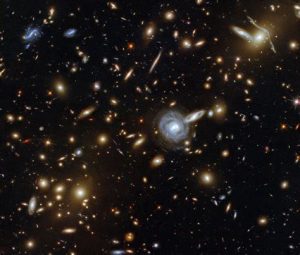
All beginnings imply endings. If you begin a book, you assume it will end, logically, happily, or sadly. When you watch a movie, you wonder what will happen next until it ends. After you’re born and you wise up a little, you probably realize you’ll die someday. Even our predictable earthbound dawn will turn to dusk. It, too, is probably inevitable.
You can't talk about the end until you talk about the beginning.
I’ve been reading cosmologist Katie Mack’s The End of Everything. Katie has a rare ability to describe cosmic doom in a clear, fascinating, and even hilarious fashion. To do that, she begins with a simple fact: you can’t talk about the end until you talk about the beginning.
My fascination with astronomy began with my father, who was a scientist. He loved to talk about Einstein and relativity and how light, like sound, can be stretched, compressed, and bent by gravity. He taught me how the planet, the solar system, the galaxies, and the universe functioned, but that was before gigantic advances in technology made it possible to explore the prelude to our cosmic dawn…the big bang theory.
In The End of Everything, Katie Mack lays down the big bang theory clearly, at least as far as anybody knows. She’s the first to admit we don’t know more than we do know, but undaunted she launches into her story by saying, “In the beginning…”
 Paradoxically, much of what we know about the cosmos comes from the Large Hadron Collider (LHC), a 17-mile-in-diameter technology-packed donut built beneath the border between France and Switzerland. The gigantic LHC is designed to accelerate gold and other heavy-metal atoms to terrific speeds, and smash them into other atoms, releasing the tiniest particles of the universe, particles so small they can only be detected by where they’ve been, particles with weird names like mesons, quarks, and gluons.
Paradoxically, much of what we know about the cosmos comes from the Large Hadron Collider (LHC), a 17-mile-in-diameter technology-packed donut built beneath the border between France and Switzerland. The gigantic LHC is designed to accelerate gold and other heavy-metal atoms to terrific speeds, and smash them into other atoms, releasing the tiniest particles of the universe, particles so small they can only be detected by where they’ve been, particles with weird names like mesons, quarks, and gluons.
And then there’s the time factor. The big bang theory separates the development of the cosmos into ages in the same way that geology does. Instead of chapters taking millions or billions of years, cosmologists separate the early big bang chapters with names like Planck time, which begins from zero (before any time existed) and extends to roughly 10-43 seconds. That’s one second divided by 1 + 43 zeros.
During that first instant though, according to a nearly infinite series of cosmologists’ calculations, a no-time, no-thing, singularity, i.e., an infinitely dense mass initiated the dawn of the cosmos. After the Planck era, came the grand unified theory, or GUT era, in which trillions of particles formed, danced, and dissolved in a soup that was too hot (i.e., compact and fast-moving) to be affected by gravity. So, from 10-43 and lasting for about 10-35 seconds, nothing stuck together, it just fizzed at an unimaginable temperature and velocity.
Of course, long after all this theoretically happened, cosmologists and quantum- and astrophysicists began measuring and calculating and applying data to formulas. Some of this data supports these time/space theories and some of the data does NOT support the theories. So, even the most skilled scientists shrug and say, “go figure.”
In the next chapter, known colorfully as the Cosmic Inflation period, the universe went through a growth spurt and increased in size by more than 100 trillion trillion or by 1026th power, bringing what had been an infinitely small “singularity” up to an entity the size of a beachball in a time span of 10-34 seconds. Pretty impressive.
How do cosmologists come up with these expansion theories, fanciful though they may sound? They do it by measuring the temperature of very old light, light that has taken billions of years to reach us. When the universe was still the size of a beachball, its temperature was uniform but as it expanded, energy frequencies called microwaves began to leak out, and scientists can measure the variations of these cosmic microwaves as they reverberated through the universe. They can then calculate backward measuring how dense and how fast these microwaves moved on their outward-bound journey.
 But we’re getting ahead of ourselves. Our cosmic dawn has not yet appeared. The beachball universe is still too dense to allow light to leak out. At about 1/10 of a millisecond in age the first protons and neutrons formed in the singularity beachball. At the two-minute mark the now-familiar basic particles formed atoms for about one-half hour. Hydrogen appeared. A stable period of expansion separated the particles enough for light to appear and the cosmic dark ages ended. It was time for the cosmic dawn.
But we’re getting ahead of ourselves. Our cosmic dawn has not yet appeared. The beachball universe is still too dense to allow light to leak out. At about 1/10 of a millisecond in age the first protons and neutrons formed in the singularity beachball. At the two-minute mark the now-familiar basic particles formed atoms for about one-half hour. Hydrogen appeared. A stable period of expansion separated the particles enough for light to appear and the cosmic dark ages ended. It was time for the cosmic dawn.
The dawn came as the cooling matter from our greatly expanded beach ball began to collect in an attraction that we recognize as gravity, where atoms gathered into gas clouds and the clouds condensed into stars and swirled into galaxies. These gobs of gas began to generate their own heat, igniting as suns. The suns began to sparkle across the universe like fireflies. The cosmic dawn had arrived.
# # #
Writer, editor, and educator based in Los Angeles. He's also played a lot of music. Degelman teaches writing at California State University, Los Angeles.
Degelman lives in the hills of Hollywood with his companion on the road of life, four cats, assorted dogs, and a coterie of communard brothers and sisters.



Thanx for the cosmology lesson Charlie, am trying to understand as much of your explanation as I can about our cosmic dawn!
Me too!
The theme of this article is dawn. It represents new beginnings, hope and the future. In the universe, it also represents the origin and evolution of all things. As described in the article, the big bang theory suggests that the universe began with an omnipresent, extremely dense “singularity”, and subsequently embarked on a journey of evolution.
At the same time, from a human perspective, “dawn” also means our curiosity and exploration of the unknown. This spirit has prompted humans to begin exploring and thinking about the universe since ancient times. However, as mentioned in the article, even though scientists have made many magnificent theories and discoveries, we still cannot fully understand the origin and evolution of the universe. This also reminds us that we need to maintain a humble and open attitude, constantly learning and improving as we explore the unknown.
In addition, the origin and evolution of the universe also cross the limitations of time and space, revealing a kind of eternal and endless existence beyond human capabilities. As the article describes, at the moment of the universe’s birth, what we usually refer to as time and space did not yet exist, which makes us deeply aware that there is something beyond human cognition and imagination in the limits of the universe.
Therefore, the theme of “dawn” has a close connection with the big bang theory. They both convey information about new beginnings, the unknown, and eternity, challenging our understanding and cognition of the essence of the universe. In this mysterious and wonderful universe, we need to maintain a humble and exploratory spirit to better understand its origin and evolution.
Thanks for your thoughtful and eloquent response, Amy. Your observations about curiosity, the infinite and unknowable nature of time and space and your conclusion that mystery remains the essence of human endeavor honors my attempts to explore and describe this complex topic. Thanks!
So much to try to understand, between your essay and Amy’s equally complex answer. You and my son David (who was a physics major at Stanford – we always thought he’d be an astrophysicist, but he went in a different direction), would enjoy each other a lot. But my brain doesn’t function at this abstract level, much as I tried to follow your explanation. Thank you for stating it in precise language. The numbers fry my brain. I am just grateful that we came into being and hope we are not stupid enough to ruin it all!
Oh dear, I failed with you, Betsy. The challenge was 1) for me to understand recent cosmo conjecture and 2) simplify and clarify our cosmic dawn. In the meantime, as you say, we have plenty to occupy ourselves to help our own hopeful pendulum swing away from Those Who Took Too Much.
No, you haven’t failed with me. You did fine. I’m just a different animal.
As always, cosmology makes my brain hurt. I stopped trying after I nearly had a cerebral hemorrhage trying to work out how the universe can be X light years across, but x + (lots more) years that old. Or vice versa. And don’t get me started on dimensions more than the 3+time that Pappy was good with!
In that case, Dave, thanks for struggling through my attempt to understand the big bang well enough to describe it to others. How else am I gonna learn?
I too have a slight headache from all this. I did try Charles but sadly got lost at the “trillion particles dissolving into soup.” And yet I am so fascinated by it all, quantum theories and my constant devotion to ‘what is consciousness’?
Your dad must have been fascinating. Like Amy, I tend to take all my scientific curiosity and my own personal spiritual beliefs and merge the two into an undefined form of pure energy riding a very slow train off the time/space Cosmic highway. Thanks anyway, it’s my bad.
Hi, Patty! Thanks for your efforts and kind response. As I said to an equally valiant Laurie “I wrote this essay in part to help ME understand this daunting kaleidoscope of theories about the big bang. I hope I understand it a little better and apologize for my opportunistic efforts to simplify and clarify!” I, too, like many scientists drowning the the mass of data from the new technology, feel that the closer we get to understanding all this, the closer we are to getting on that “slow train off the time/space Cosmic highway.
FYI: Here’s a short Retro piece I wrote about another scientific adventure with my old man, and will give you a little clearer idea of the origins of my scientific curiosity and basic knowledge: https://www.myretrospect.com/stories/sputnik/
Thanks for taking this prompt to the ultimate “dawn”–it spoke to my own interest in the big picture, and I was impressed that you tried to explain the concepts. I find it remarkable that the bits of matter that formed in the process of universe expansion have developed the ability (in the form of us) to collect the data to trace back so much cosmology in a form of “self-consciousness”. And remarkable that just as we get ever closer to understanding the infinite, we get closer to our own annihilation. And so it goes.
Yeah, Khati, you’re taking it to the place where the author and cosmologists all imply that humanity and its curiosities and flirtations give us intent and momentum to look past our own fragile mortality toward a future where we will be irrelevant. Pretty much inevitable end for us.
Thanks for sharing this complex essay (for me at any rate). Like some other readers, my brain just can’t grasp all of this. My husband, on the other hand, will love it. I’ll have him read it after he stops working.
Thanks, Laurie! Full confession, I wrote this essay in part to help ME understand this daunting kaleidoscope of theories about the big bang. I hope I understand it a little better and apologize for my opportunistic efforts to simplify and clarify!
Fascinating essay, Charlie. Well written and nicely researched. One line that resonated with me, however, is that we can’t talk about the ending without talking about the beginning. Obviously, life is what happens in between. I once thought that the nature of our beginnings was a huge determinant of how life would play out. I haven’t thought that in a couple decades now, though. Life is what we decide to make of it and now we react to the beginnings, the middles, and even the end.
Thanks for plowing thru my attempts to understand the entire spectrum from quantum physics to cosmology. I was intrigued by your evolution in your origins thoughts. I went through a similar evolution but it took me quite a while to get past the family origins historical-material phase of development to the point where I began to feel in control of my own destiny.
Recently I had a good time dividing my life “development” into 20 year episodes. First 20 living in the lights and shadows of my upbringing; second 20 processing the first 20; third 20 figuring out what I want to do and do it well; fourth 20 putting it all to work fulfilling my intentions; fifth 20… 😝